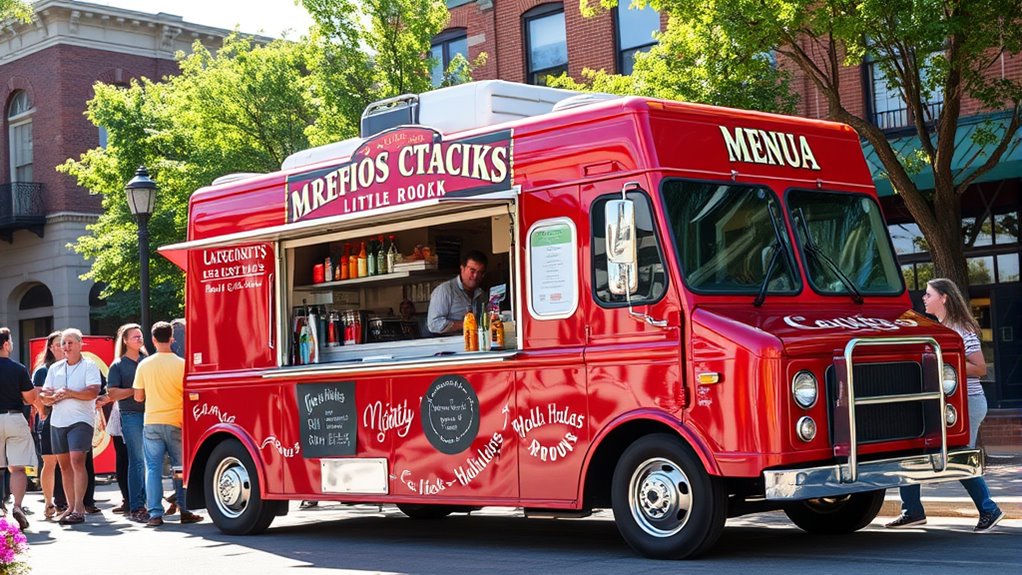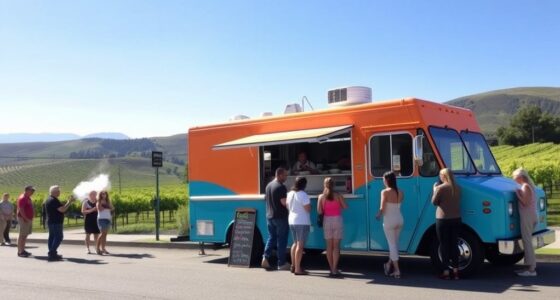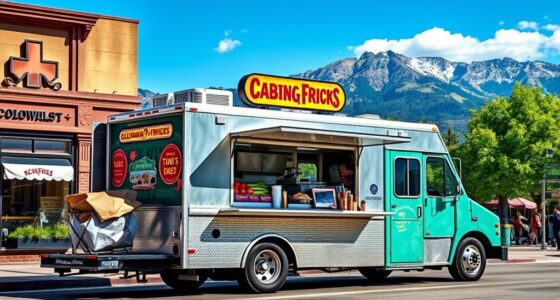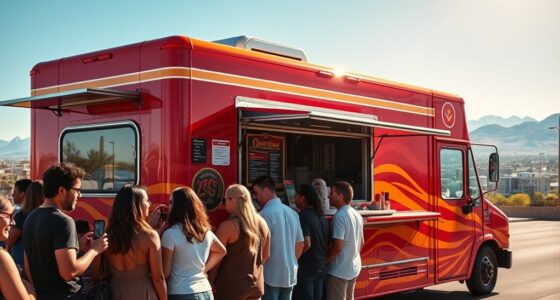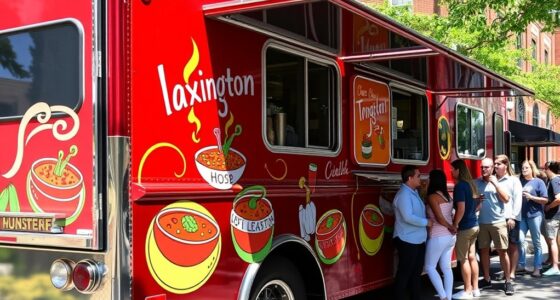To start a food truck in Little Rock, AR, you need to understand local permits, parking zones, and health regulations. Create a clear business plan, design an eye-catching truck, and develop a menu that appeals to your target audience. Use online portals to apply for permits and maintain proper recordkeeping. Focus on community engagement and marketing to build your customer base. Continue exploring for detailed tips and strategies to launch your food truck successfully.
Key Takeaways
- Research Little Rock’s food truck permits, zoning laws, and online application portals to ensure legal compliance.
- Develop a creative, eye-catching food truck design to attract customers and build brand recognition.
- Secure necessary licenses, permits, and insurance, and identify designated parking zones for food trucks.
- Plan your menu, source local ingredients, and implement efficient POS systems to streamline operations.
- Engage with the community through social media, local events, and collaborations to grow your customer base.
Food Truck Industry Overview

Have you ever wondered why food trucks have become such a popular dining option? The food truck industry thrives on eye-catching food truck design that attracts attention and sets you apart. Engaging your customers through creative layouts and vibrant branding helps boost customer engagement and encourages repeat visits. The industry offers flexibility, lower startup costs, and the ability to test different markets quickly. Mobile food vendors can adapt to food trends and busy locations, making them a popular choice for entrepreneurs. Successful food trucks focus on creating a memorable experience with appealing visuals and engaging interactions. This approach helps build a loyal customer base and spreads word-of-mouth, fueling growth in the competitive Little Rock food scene.
Understanding Local Requirements

To operate a food truck in Little Rock, you need to understand the local requirements, like using online permit application portals. You’ll also have to follow sanitation protocols and keep proper records, ensuring compliance with health standards. Additionally, knowing where you can park your truck, such as designated zones, is essential to stay within regulations. Familiarizing yourself with local regulations related to mobile food vending can help you avoid penalties and operate smoothly.
Online Permit Application Portals
Guiding the online permit application portals for your food truck in Little Rock is a straightforward process once you understand the local requirements. These digital application systems simplify submitting your permits and tracking progress. To get started, you should:
- Review the specific permits needed on the city’s official online permit portals.
- Prepare all required documents, including licenses and proof of insurance.
- Complete the online application forms accurately, ensuring all information matches your supporting documents.
Using these digital systems streamlines the process, saving you time and reducing errors. Familiarize yourself with the portal’s navigation and submission guidelines before applying. By understanding how to navigate local online permit portals, you’ll ensure your application is complete, correct, and submitted promptly.
Sanitation Protocols and Recordkeeping
After completing your permit applications through the online portals, focusing on sanitation protocols and recordkeeping guarantees your food truck stays compliant with local health regulations. Maintaining strict food safety practices is essential to prevent contamination and ensure customer well-being. You’ll need to follow hygiene standards by regularly cleaning and sanitizing surfaces, utensils, and equipment. Keep detailed records of all cleaning schedules, temperature logs, and food sourcing, as these prove your commitment to food safety. Regularly monitor food temperatures during prep and storage, and document inspections and corrective actions. Staying organized with your records helps you quickly respond to health department inquiries and demonstrates your dedication to maintaining hygiene standards. Consistent sanitation and thorough recordkeeping protect your reputation and ensure your food truck operates smoothly.
Designated Truck Parking Zones
Understanding local requirements for designated truck parking zones is essential to keep your food truck operating legally and smoothly. Little Rock enforces parking regulations through zone enforcement, which dictates where you can park. To comply, you should:
- Identify approved parking zones, typically near busy areas or designated food truck zones.
- Follow time restrictions within these zones to avoid violations.
- Stay updated on zone enforcement notices to prevent fines or impoundments.
Failing to adhere to parking regulations can lead to penalties or disruptions in your service. Make sure you verify zone boundaries regularly, as they may change. By understanding and respecting designated truck parking zones, you ensure your food truck operates without issues and maintains good standing with local authorities.
Setting Up Your Base of Operations

Choosing the right space is vital when setting up your base of operations, and shared kitchen licensing options can be a smart choice to save costs and meet health regulations. Planning a custom kitchen layout guarantees your workspace is efficient and tailored to your menu needs. Consider these points carefully to build a solid foundation for your food truck business in Little Rock. Additionally, embracing creative practice can help you develop innovative menu ideas and unique branding strategies that set your food truck apart.
Shared Kitchen Licensing Options
Setting up your food truck in Little Rock often involves utilizing shared kitchen spaces, which offer a cost-effective way to meet licensing and health requirements. Shared kitchens provide flexible licensing options, making it easier to start without investing in a dedicated facility. When choosing a shared kitchen, consider these factors:
- Licensing Compatibility: Ensure the space meets local health department standards and permits your specific food operations.
- Availability of Certification: Confirm the shared kitchen has existing certifications to streamline your licensing process.
- Cost and Access: Compare rental fees and hours of access to find an option that fits your budget and schedule.
Using shared kitchens simplifies maneuvering licensing options and helps you stay compliant while focusing on growing your food truck business.
Custom Kitchen Layout Planning
Designing your custom kitchen layout is a essential step in establishing an efficient and compliant food truck operation. Proper layout optimization ensures smooth workflow, safety, and adherence to health regulations. Start by mapping out your equipment and prep stations to maximize space and minimize movement. Think about proximity—placing your sink near your prep area or stove nearby storage saves time and effort. Use the following layout as a guide:
| Station | Purpose |
|---|---|
| Cooking Area | Stove, oven, fryer |
| Prep Station | Cutting, assembling |
| Storage | Ingredients, utensils |
| Cleaning Zone | Sink, waste disposal |
This custom kitchen design helps streamline operations, reduce clutter, and improve service speed, making your food truck a well-oiled machine.
Budgeting and Financing Your Food Truck

Budgeting for your food truck involves understanding initial equipment costs and exploring local small business grants to help cover expenses. You’ll also need to budget for liability coverage to protect your business. Getting these finances in order sets a solid foundation for your food truck’s success in Little Rock. Additionally, researching grocery savings strategies can help reduce operational costs and increase profitability as you grow your business.
Initial Equipment Purchase Costs
Starting your food truck journey requires a clear understanding of the initial equipment costs involved. You’ll need to budget for essential items to guarantee smooth operations. First, investing in quality kitchen equipment is crucial—this includes stoves, refrigerators, and prep stations, typically costing between $10,000 and $25,000. Second, vehicle modifications are necessary to convert your truck into a fully functional kitchen, which can range from $15,000 to $40,000 depending on the extent of upgrades. Third, don’t forget miscellaneous expenses such as sinks, shelving, and safety equipment, which often add up to $5,000. These costs are imperative for compliant, efficient service and directly impact your startup budget. Proper planning helps avoid surprises and secures your food truck’s successful launch.
Local Small Business Grants
Securing local small business grants can provide a vital financial boost for your food truck venture, reducing the burden of upfront costs. These grants support entrepreneurs who want to tap into Little Rock’s vibrant food truck culture and ride the wave of current culinary trends. Local government agencies, non-profits, and economic development organizations often offer grants aimed at small businesses, especially those promoting community engagement or innovative cuisine. Applying requires a solid business plan, proof of community support, and a clear vision for your truck’s role in local food scenes. Taking advantage of these grants can help you cover equipment, permits, or initial marketing efforts, giving you a stronger footing as you introduce your concept to Little Rock’s bustling food truck scene.
Liability Coverage for Food Trucks
Liability coverage is a crucial aspect to contemplate when financing your food truck, as it protects your business from potential legal claims and financial setbacks. Ensuring you meet insurance requirements is essential for compliance and peace of mind. Here’s what you should consider:
- Understand the specific liability coverage needs based on local regulations and your menu.
- Shop around for policies that offer extensive protection without exceeding your budget.
- Confirm that your liability coverage includes coverage for property damage, bodily injury, and product liability.
Designing Your Menu and Pricing Strategy

When designing your menu, focus on sourcing ingredients locally to guarantee freshness and support nearby farmers. Implement dynamic pricing strategies to adapt to demand and maximize profits throughout the day. This approach helps you create a menu that’s both appealing and profitable for your Little Rock food truck. Additionally, understanding how to efficiently manage equipment, such as ensuring your tires are properly inflated and well-maintained, can improve your operational reliability and customer satisfaction. Tire longevity in storage is a crucial aspect of maintaining your vehicle’s performance and safety.
Locally Sourced Ingredient Selection
Choosing locally sourced ingredients can markedly enhance your menu’s appeal and authenticity. By focusing on seasonal menu planning, you guarantee fresh, flavorful dishes that resonate with customers. To effectively implement ingredient sourcing methods, consider these steps:
- Build relationships with local farmers and vendors to access seasonal produce and specialty items.
- Prioritize ingredient sourcing methods that promote sustainability and support the local economy.
- Adjust your menu regularly based on seasonal availability, which keeps offerings exciting and reduces waste.
This approach not only boosts the quality of your dishes but also creates a compelling story for your food truck. Customers appreciate freshness and community connection, making locally sourced ingredients a smart choice for your Little Rock venture.
Dynamic Pricing Strategies
Implementing dynamic pricing strategies can substantially boost your food truck’s profitability and customer satisfaction. With demand-based adjustments, you can set prices that reflect real-time customer interest, maximizing revenue during busy times and attracting more diners when demand is lower. Dynamic pricing allows you to analyze factors like time of day, weather, and local events to modify menu prices accordingly. This flexibility helps optimize sales without sacrificing quality or service. To succeed, monitor customer flow and sales patterns regularly, then tweak your prices based on demand. By employing demand-based adjustments, you ensure your prices remain competitive yet profitable, meeting customer expectations while increasing your bottom line. This adaptable approach keeps your food truck responsive to market conditions and customer preferences.
Technology and Operations

Using wireless card readers and apps can streamline your sales process and improve customer experience. Real-time stock tracking software helps you stay on top of inventory and avoid shortages. Embracing these tools keeps your food truck running smoothly and efficiently. Incorporating e-commerce integration allows you to accept online orders and expand your customer reach.
Wireless Card Readers and Apps
Wireless card readers and apps have revolutionized how food trucks process payments, making transactions faster and more secure. With these tools, you can accept cashless payments and support mobile ordering, improving customer convenience. They also enable you to streamline operations and reduce wait times. To maximize their benefits, consider these key features:
- Integration with POS systems for seamless transaction flow
- Compatibility with various mobile payment options like Apple Pay and Google Wallet
- Real-time sales tracking and reporting for better inventory management
Real-Time Stock Tracking Software
As food trucks adopt wireless card readers and apps to speed up payments, keeping track of inventory in real time becomes just as important to prevent shortages and overstocking. Real-time stock tracking software streamlines inventory management, allowing you to monitor ingredient levels instantly. This helps you make informed purchasing decisions, reduce waste, and ensure popular items stay available. Accurate inventory data also supports building customer loyalty by consistently offering favorites without running out. With automated alerts for low stock, you can restock promptly and maintain smooth operations. Implementing this technology minimizes manual errors and saves time, giving you more focus on customer service. Ultimately, real-time stock tracking keeps your food truck well-stocked, efficient, and responsive to customer demand, strengthening your reputation and profitability.
Marketing and Growing Your Presence

To boost your food truck’s visibility, start by scheduling your weekly events consistently so customers know where to find you. Use engaging Instagram Stories to highlight daily specials, behind-the-scenes moments, and customer interactions to keep your audience interested. These strategies can help grow your presence and turn casual followers into loyal patrons.
Weekly Event Scheduling Tips
Consistently scheduling your food truck events is essential for building a loyal customer base and increasing your visibility in Little Rock. Effective weekly event scheduling relies on strategic food truck calendar planning to keep your brand top of mind. To optimize your efforts:
- Choose consistent days and times to create predictability for customers.
- Coordinate with local events or markets to maximize exposure.
- Analyze traffic patterns and customer feedback to refine your schedule.
Engaging Instagram Stories
Engaging Instagram Stories can substantially boost your food truck’s visibility and attract more customers in Little Rock. Use stories to showcase daily specials, behind-the-scenes moments, or customer testimonials to strengthen your food truck branding. Keep content authentic and visually appealing to resonate with your audience. Incorporate polls, questions, or countdowns to encourage interaction. Regularly review Instagram analytics to identify which stories generate the most engagement, helping you refine your content strategy. Consistent, engaging stories keep your followers interested and remind them why they should visit your food truck. This dynamic approach builds a loyal customer base and increases foot traffic, ultimately growing your presence in Little Rock’s vibrant food scene.
Local Networking Opportunities Await
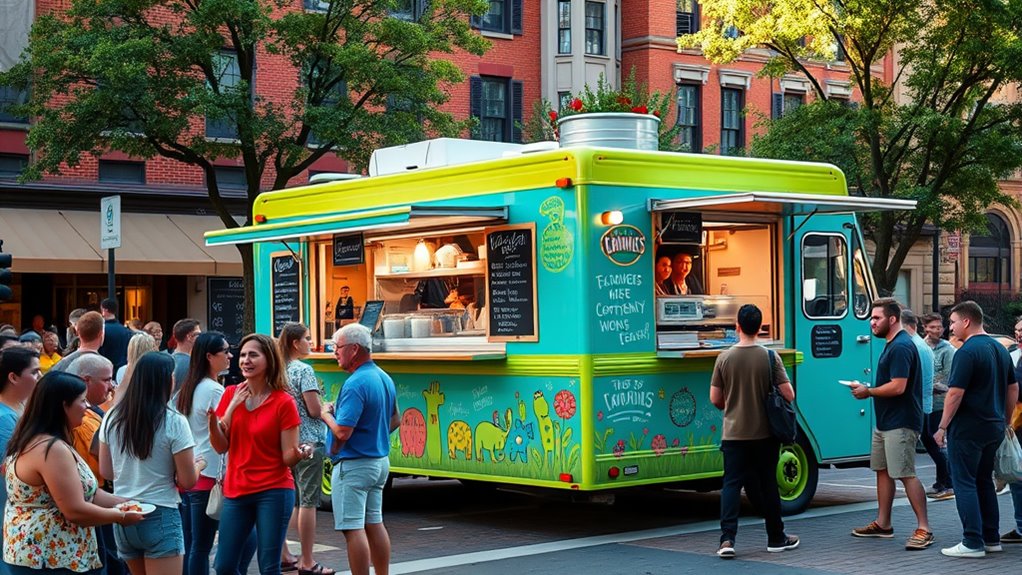
Little Rock offers vibrant networking opportunities that can help your food truck thrive. Participating in food truck festivals is a great way to showcase your menu and connect with customers and fellow vendors. Local food markets also provide consistent foot traffic and chances to build relationships within the community. To maximize these opportunities, consider:
- Attending food truck festivals regularly to increase visibility and network with event organizers.
- Setting up at local food markets to establish a loyal customer base.
- Joining local food truck associations or groups to stay informed about upcoming events and collaborate with other vendors.
These avenues not only boost your sales but also help you integrate into Little Rock’s lively food scene, opening doors for growth and partnerships.
Frequently Asked Questions
What Permits Are Required Specifically for Mobile Food Trucks in Little Rock?
To operate a mobile food truck in Little Rock, you need to obtain a city business license and a mobile food vendor permit. You should also check parking regulations to guarantee you can park legally at your chosen locations. Additionally, you’ll need to meet insurance requirements, including liability coverage, to protect yourself and comply with local laws. Make sure to stay updated on any changes to these permits and regulations.
How Can I Find Reliable Suppliers for Ingredients and Equipment Locally?
It’s no coincidence that you find reliable local ingredient sources and equipment suppliers by exploring Little Rock’s vibrant food scene. Visit farmers’ markets, chat with local chefs, and join industry groups to get insider recommendations. Check online directories and social media for trusted local equipment suppliers. Networking helps you discover trustworthy sources, ensuring fresh ingredients and quality gear, so your food truck stands out with first-rate offerings.
What Are the Most Popular Food Truck Cuisines in Little Rock?
In Little Rock, popular food truck cuisines include BBQ, Southern comfort food, tacos, and Asian fusion. To stand out, focus on strong food truck branding that highlights your unique flavors. Use social media marketing to showcase daily specials and customer favorites, attracting more fans. Engaging visuals and consistent updates help build a loyal following. Stick to these strategies, and you’ll increase your visibility and success in the local food truck scene.
Are There Any Restrictions on Operating Hours for Food Trucks in the City?
In Little Rock, you need to follow specific operating hours and noise restrictions for your food truck. Typically, operating hours are limited to make certain you’re not open too late, usually ending by 10 or 11 pm. Noise restrictions aim to keep the neighborhood peaceful, so avoid loud music or noise during late hours. Always check with local ordinances or the city’s business department to stay compliant and avoid fines.
How Do I Handle Waste Disposal and Sanitation Requirements Effectively?
Picture your food truck as a beacon of cleanliness amidst Little Rock’s bustling streets. You handle waste management by setting up designated bins for trash and recycling, ensuring they’re emptied regularly. Follow sanitation standards by cleaning surfaces thoroughly and maintaining proper food storage. Use biodegradable products when possible, and stay informed about local regulations. This proactive approach keeps your truck hygienic, attracts customers, and keeps your operation compliant and eco-friendly.
Conclusion
Starting your food truck in Little Rock is an exciting journey, blending modern strategy with the timeless charm of Southern hospitality. Embrace the adventure, learn from fellow vendors, and stay adaptable like a trusty steed in a wild west showdown. With passion and perseverance, you’ll turn your culinary dreams into reality, making memories and connections that last longer than a penny post. So, gear up and hit the streets—your food truck legacy awaits!
